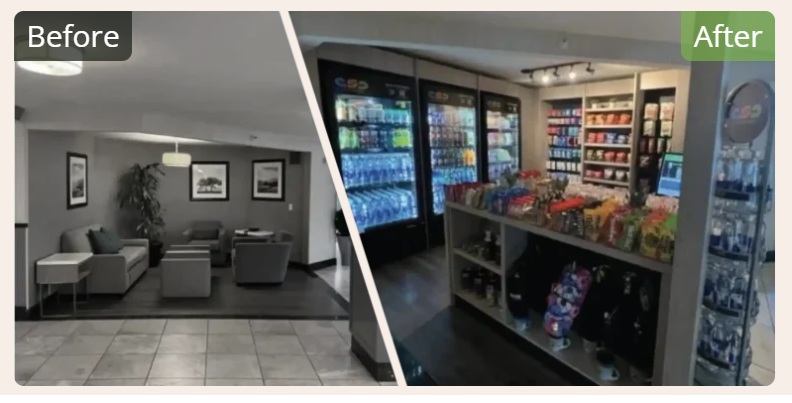
Maintaining seamless operations while ensuring guest satisfaction is a constant challenge. Fluctuating staffing levels, particularly during late-night hours, often leave guests without access to essential items, leading to frustration and potential dissatisfaction. To address these issues, many hotels are turning to innovative solutions like self-checkout lobby markets, which offer convenience for guests and operational efficiency for hotel management.
Incorporating self-checkout lobby markets like GrabScanGo into hotel operations addresses the challenges posed by fluctuating staffing levels and evolving guest expectations.
The Challenge of Variable Staffing Levels
Hotel operations experience significant fluctuations in activity throughout the day. Peak periods, such as late mornings and early afternoons, require a full complement of staff to manage check-ins, check-outs, and dining services. Conversely, during late-night hours, hotels often operate with minimal staff, typically including a night auditor and a security guard. This lean staffing model is cost-effective but can leave guests without access to basic necessities during these times.
The Rise of Self-Checkout Lobby Markets
To bridge the service gap caused by variable staffing, hotels are increasingly implementing self-checkout lobby markets. These markets function as 24/7 convenience stores within the hotel, allowing guests to purchase snacks, beverages, toiletries, and other essentials at any time. The self-service model ensures that guests’ needs are met promptly, without requiring additional staff involvement.
Benefits of Self-Checkout Markets
- Enhanced Guest Experience: Guests appreciate the convenience of accessing necessary items without waiting for staff assistance, particularly during late hours. This autonomy aligns with the modern preference for self-service options, contributing to higher guest satisfaction.
- Operational Efficiency: By reducing the demand on front desk and concierge staff, especially during peak times, self-checkout markets allow employees to focus on more complex tasks, improving overall service quality.
- Increased Revenue: Offering a variety of products on a 24/7 basis can boost incidental sales, providing an additional revenue stream for the hotel.
Implementing a Successful Self-Checkout Market
For a self-checkout lobby market to be effective, careful planning and execution are essential. Key considerations include:
- Product Selection: Curate a range of high-quality items that cater to guest preferences, including local specialties to enhance the guest experience.
- User-Friendly Technology: Implement intuitive self-checkout systems that accept various payment methods, ensuring a seamless transaction process for guests.
- Regular Maintenance and Restocking: Establish protocols for timely restocking and maintenance to keep the market appealing and functional.
Conclusion
By providing round-the-clock access to essential items, hotels can enhance guest satisfaction, streamline operations, and create new revenue opportunities. As the hospitality industry continues to evolve, embracing such innovative solutions will be key to staying competitive and meeting the needs of today’s travelers.








